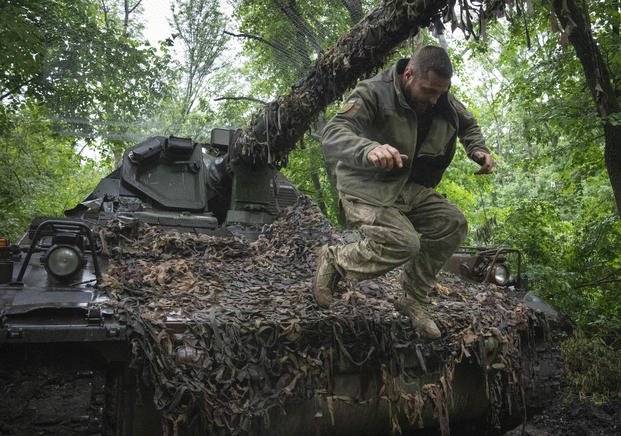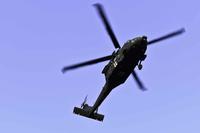When Russia invaded Ukraine in February 2022, Ukraine’s military was largely reliant on Soviet-era weaponry, from tanks to artillery to fighter jets.
While that arsenal helped Ukraine fend off an assault on the capital of Kyiv and prevent a total rout in the early weeks of the war, billions of dollars in military assistance has since poured into the country, including more modern Western-made weapons.
Ukraine’s counteroffensive, now in its early stages, could offer a glimpse of whether and to what extent the newer weapons systems have strengthened Kyiv’s ability to stand up to Russia.
Analysts are cautiously optimistic.
“Ukraine is in a much better position to be able to conduct a combined arms warfare than where they were in the beginning of Russia’s full-scale reinvasion of Ukraine,” George Barros, a Russia analyst for the Center for Strategic International Studies said.
Here’s a look at some of the Western weapons sent to Ukraine and what advantages they might offer.
Striking Targets
One sophisticated U.S.-made rocket launcher sent to Ukraine has received a lot of attention — and for good reason: High Mobility Artillery Rocket Systems gave Kyiv's forces the ability to hit targets farther away and with much greater accuracy than Soviet-designed ones.
In the fall counteroffensive, the HIMARS — which currently give troops the capability to strike a target up to 80 kilometers (50 miles) away and then quickly move on — were used to destroy bridges near the southern city of Kherson, cutting Russian troops off from one another and their supply routes.
Ukraine has since clamored for longer-range missiles that can also be launched by the HIMARS and could reach up to 300 kilometers (190 miles) away. But the U.S. and its allies have been reluctant to provide them.
However, Washington agreed in February to send Ground-Launched Small Diameter Bombs, which have a range of 150 kilometers (90 miles) when fired by HIMARS, and the U.K. announced the delivery of Storm Shadow cruise missiles — with a range of 550 kilometers (340 miles).
Both weapons already have been spotted in combat, extending Ukraine’s reach.
Air Defense
Throughout the war, Russia has rained missiles down on Ukrainian cities and infrastructure almost daily.
To defend against those barrages, the West has sent Ukraine the Patriot and the Avenger air defense systems.
At $4 million per round, Patriot missiles are meant to shield against larger ballistic missile attacks, leaving simpler weapons to deal with the cheap, slow-flying Iranian exploding drones often used by the Russians.
Even with these new air defense systems, Ukraine has struggled to protect its territory against daily Russian attacks.
Russia has relied on long-range ballistic and cruise missiles to strike targets deep in Ukraine, avoiding a risk to its warplanes after losing many of them in the initial stages of the invasion. Moscow’s failure to win control of Ukrainian airspace was one of the biggest surprises of the war.
Ukraine also has kept its much smaller air force made of Soviet-made Sukhoi and Mig-29 jets away from the front line and used them to launch missiles from large distances to minimize losses.
Ukraine long has pushed for Western jets, but their delivery isn’t expected any time soon.
“Ukraine would be a lot in a better position for a more decisive victory and success on a shorter timeline if we took these decisions a lot faster,” Barros said.
Artillery
Long known as the “King of Battle,” artillery systems are key in any war — but especially the one in Ukraine. Russian troops have dug themselves in throughout the south and east of the country. Driving them out will require significant artillery.
Artillery can take out buildings and enemy weapons from reasonable distances and cause such chaos that opposing troops are forced to withdraw. Ukrainian forces are making heavy use of artillery in the battles around Zaporizhzhia, where the beginnings of the counteroffensive are unfolding.
Ukraine had plenty of artillery to begin with — but now it has American M777s and German Panzerhaubitze 2000 howitzers, both of which are more accurate and powerful than what it started the war with.
Tanks and Armored Vehicles
Ukraine needs the “punching force” of tanks and other fighting vehicles if it's going to break through Russian lines, Barros said.
Tanks delivered thus far — which include multiple models of German Leopards and the British Challengers — are more sophisticated than the Soviet-designed T-64 and T-72 tanks Ukraine relied on at the start of the invasion.
They also have far better armor and can strike more accurately than Russia's tanks, according to Craig Cartier, a retired Soviet Union analyst for the U.S. with more than three decades of experience.
The U.S., meanwhile, has sent Bradley fighting vehicles, which offer better protection for troops they carry and have better firepower compared to Soviet-era armored vehicles that Ukraine has used.
All of these vehicles can inflict high casualties and destroy other weapons systems, making them invaluable for a counteroffensive.
Training
Perhaps most crucial to Ukraine’s success, however, has been the Ukrainians themselves. Both Barros and Cartier said the experience and training of Ukrainian troops, not just the weapons provided by the West, has made them a lethal force.
The Ukrainians “have demonstrated the ability to not only master the equipment and tactics, but to be able to do things nobody else has been able to do, as demonstrated by their (air defense) wizardry,” Cartier said.
In the U.K. and Germany, in addition to other neighboring countries, Ukrainian forces have been trained on infantry tactics and on certain specialized equipment, such as the Challenger-2 tanks.
It's impossible to know how the counteroffensive will unfold, Barros said.
“What I will say is every single time that the Ukrainians have had an opportunity to demonstrate their fortitude and resolve on the battlefield, they’ve always outperformed expectations," he said.











